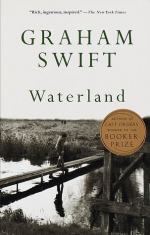|
This section contains 6,040 words (approx. 16 pages at 400 words per page) |

|
In the following essay, Landow identifies Waterland as a "self-reflexive text," focusing on the novel's treatment of the nature of storytelling, history, and the novel's relation to works by Dickens and Faulkner.
Children [are those] to whom, throughout history, stories have been told, chiefly but not always at bedtime, in order to quell restless thoughts; whose need of stories is matched only by the need adults have of children to tell stories to, of receptacles for their stock of fairy-tales, of listening ears on which to unload, bequeath those most unbelievable yet haunting of fairy-tales, their own lives.
Graham Swift's Waterland (1983), a novel cast in the form of a fictional autobiography, has much to tell us about the fate, even the possibility, of autobiography, in the late twentieth century. Although Waterland does not confuse personal with public history, it intertwines them, making each part of the other...
|
This section contains 6,040 words (approx. 16 pages at 400 words per page) |

|




